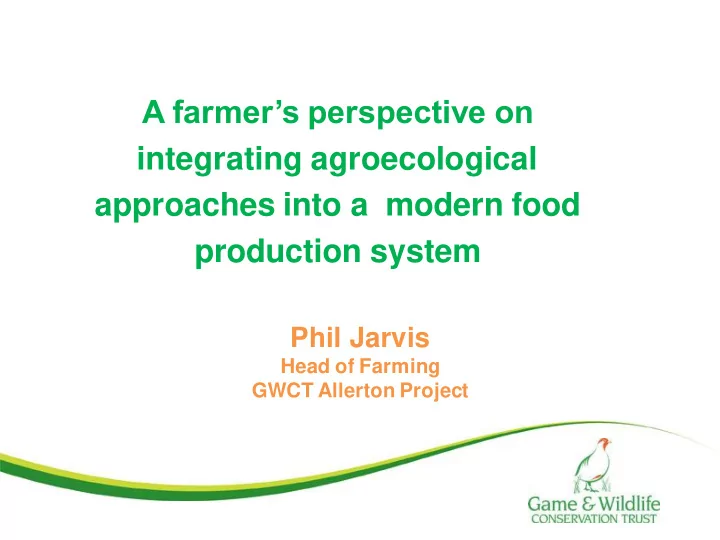

A farmer’s perspective on integrating agroecological approaches into a modern food production system Phil Jarvis Head of Farming GWCT Allerton Project
The Allerton Project
What we do !! LODDINGTON 1992-2015
The rationale for sustainable intensification and agroecological approach • Population Growth • Environmental challenges from intensifying farming activities • In order to achieve sustainable intensification policy makers, academics and growers need to increase their understanding and develop agroecological principles
Polarised views – both searching for the perfect solution ! Conventional Organic Agriculture Farming
Conventional Agriculture Organic IPM/ICM Farming
Conventional Agriculture Food Production Profit Conservation IPM/ICM Sustainable Agriculture Business The Win Wins Environment Social Organic Farming
Soil nutrients and health RB209/ Herbicide/ T1, T2, T3, T4 Soil Chemistry - Carbon - Nitrogen /Legumes - Phosphate - Cation exchange sites Soil Biology - the microbial community - Earthworms - Organic matter STRUCTURE
Encouraging earthworms NIT CONV
Soil conservation and reduced cultivation
Direct drill or strip-tillage?
1997 (%) 2002 (%) Reduced Cultivations Plough Plough 0 0 29 29 Non Non 71 87 Inversion Inversion DD/ Strip DD/ Strip 2004 (%) 2014 (%) 5 Plough Plough 6 27 30 Non Non 65 67 Inversion Inversion DD/ Strip DD/ Strip Source; Allerton Project
Diesel fuel use 7000 6000 5000 4000 DD Non Inv 3000 Plough 2000 1000 0 1997 2002 2004 2014 Source; Allerton Project and WCF Potential of No-Till (R. Godw in)
Identifying problems • Weeds - Blackgrass, Crop Volunteers crop competition, cultural, chemical, alleopathy • Pests - Slugs and Insects Cultural, ferric, seedbed • Disease – Fusarium, Septoria, Yellow Rust rotation, variety choice, PPP
Plant breeding – beneficial traits
Rotations – utilising legumes and clover
Rotations – longer breaks
Rotations - spring cropping
Rotational grass/livestock
Cover crops
Productivity – wheat yields Winter Wheat (t/ha) 10 8 6 4 2 0 Source; Allerton Project
Profitability Source; GWCT Annual Review
Biodiversity agri-environment
Buffers and margins
Biodiversity - pollinators
Biodiversity – encouraging farmland birds
Productivity of field margins Source : P Jarvis MSc (2011) …study of winter wheat headland and mid-field yields
Food chain integration
Consumer links
Knowledge exchange
Opportunities and barriers to wider adoption • Knowledge Transfer -Farmers, Universities • Market Opportunities • Financial security • Agri-environment support • Policy Drivers
Recommend
More recommend